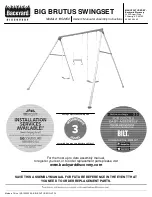
Positioning Your Playcenter
•
The playcenter is designed to be installed on a
level surface by an adult with an adult helper.
Place in a fl at area of your yard to minimize ground
preparation.
•
Choose a level location for the equipment. This
can reduce the likelihood of the play set tipping
over and loose-fi ll surfacing material washing away
during heavy rains.
•
Place the equipment not less than 6 ft (1.8 m) from
any structure or obstruction such as a fence,
garage, house, overhanging branches, laundry
lines, or electrical wires.
•
Provide enough room so that the children can use
the equipment safely. For example, for structures
with multiple play activities, a slide should not exit
in front of a swing.
•
It is a good idea to place your playcenter in an area
that is convenient for adults to watch children at play.
•
Create a site free of obstacles that could cause injuries
– such as low overhanging tree branches, overhead
wires, tree stumps and/or roots, large rocks, bricks and
concrete. Additional suggestions in the Suggested
Playground Surfacing Section.
•
Do not build your playset on top of surfacing material.
•
Locate bare metal platforms and slides out of direct
sunlight to reduce the likelihood of serious burns. A slide
that faces north will receive the least direct sunlight.
•
Separate active and quiet activities from each other.
For example, locate sandboxes away from swings or
use a guardrail or barrier to separate the sandbox
from the movement of the swings.
Suggested Playground Surfacing
•
Do not install home playground equipment over
concrete, asphalt, packed earth, grass, carpet, or
any other hard surface. A fall onto a hard surface
can result in serious injury to the equipment user.
•
Do not install loose fi ll surfacing over hard surfaces
such as concrete or asphalt.
•
Shredded bark mulch, wood chips, fi ne sand and
fi ne gravel, are added as shock absorbing materials
after assembly. If used properly these materials can
absorb some of the impact of a child’s fall.
•
All surface material should extend a minimum of 6ft
(1.8m) feet in all directions around the play area.
•
Do not apply playground surfacing until after the
unit is completely constructed. Playset should not
be built on top of surfacing.
•
Use containment, such as digging out around
the perimeter and/or lining the perimeter with
landscape edging.
•
Installations of rubber tiles or poured-in-place
surfaces (other than loose-fi ll materials) generally
require a professional and are not “do-it-yourself”
projects.
•
Shall use Playground Surfacing Materials (other
than loose-fi ll material) which comply with the
safety standard ASTM F1292 Standard Specifi cation
of Impact Attenuation of Surfacing Materials within
the Use Zone of Playground Equipment.
The following chart explains the fall height in feet from which a life threatening head injury would not be expected
Critical Heights in feet (m) of Tested Materials
Material
Compressed Depth
6" (152mm)
9" (228mm)
12" (304mm)
to 9" (228mm)
Wood Chips
7' (2.13m)
10-12' (3.0-3.6m)
11' (3.35m)
10' (3.05m)
Double-Shredded Bark Mulch
6' (1.83m)
10-12' (3.0-3.6m)
11' (3.35m)
7' (2.13m)
Engineered Wood Fibers
6' (1.83m)
7' (2.13m)
>12' (3.66m)
6' (1.83m)
Fine Sand
5' (1.52m)
5' (1.52m)
9' (2.74m)
5' (1.52m)
Coarse Sand
5' (1.52m)
5' (1.52m)
6' (1.83m)
4' (1.22m)
Fine Gravel
5' (1.52m)
7' (2.13m)
10' (3.05m)
6' (1.83m)
Medium Gravel
5' (1.52m)
5' (1.52m)
6' (1.83m)
5' (1.52m)
Shredded Tires*
10-12' (3.0-3.6m)
N/A
N/A
N/A
Uncompressed Depth
*This data is from tests conducted by independent testing laboratories on a 6-inch depth of uncompressed shredded tire samples produced by four manufacturers. The tests reported
critical heights, which varied from 10 feet to greater than 12 feet. It is recommended that persons seeking to install shredded tires as a protective surface request test
data from the supplier showing the critical height of the material when it was tested in accordance with ASTM F1292.
Please Read This Before Starting Assembly
Owner’s Manual
6























